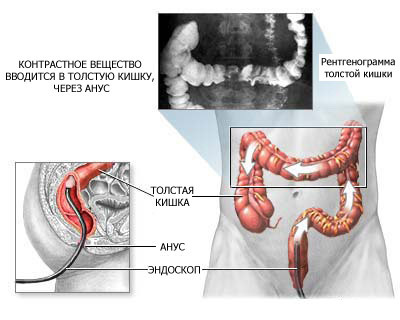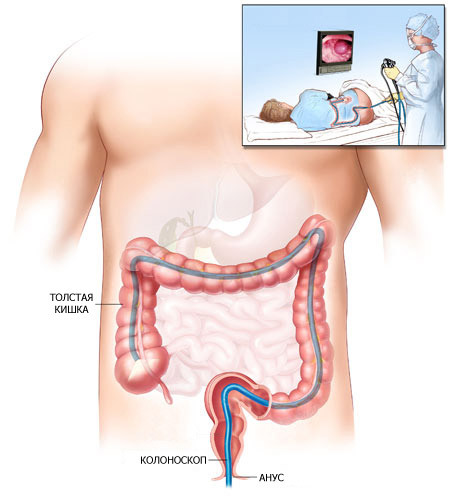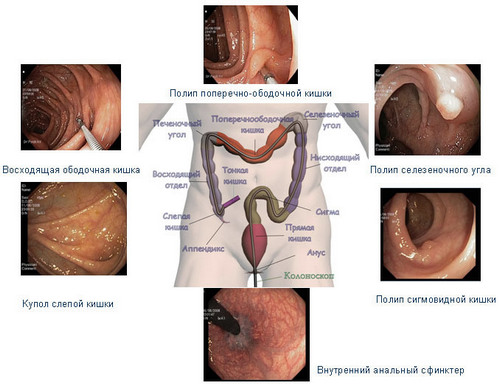Despite the same the examined parts of the digestive tract, barium enema and colonoscopy are different from each other, as two principal methods.
Barium enema (irrigation means irrigation) is a method that examines an x-ray of the bowel, (irrigography) which are filled with a special radiopaque substance is a suspension of barium.
Sometimes, in order to quality became even better, apply the subsequent pumping of air into the colon. This process is called “double-contrast”, and this procedure is more informative. From the introduction of air to the patient becomes sicker, and the research he carries quietly.
For the procedure a barium enema, the patient to the intestine after enema is introduced radiopaque substance. Thus, the process does not provide for the introduction of intestinal foreign objects and tools with fiber optics, as is studied by the radiologist. This is its main difference. That is why the barium enema less painful than colonoscopy, which is invasive method and can be painful.
Colonoscopy is a manipulation, during which the colon introduces a flexible colonoscope, which is controlled by the doctor. Advance sequentially through the straight, sigmoid, descending, transverse colon part of the large intestine. If the study fails to diagnose all parts of the colon up to the ileocecal angle and the dome of the cecum. In the process of moving periodically into the intestine air is supplied, which facilitates review and allows a flexible instrument with fiber optics and high-power led lighting to repeating the physiological curves of the intestine and follow along. Of course, because of this, a colonoscopy can be felt a few painful procedure.

In the practice of the gastroenterologist often there are numerous indications for research of the colon not only in its terminal divisions (straight and sigmoid colon), but in the higher. For this purpose, such instrumental diagnostic procedures like colonoscopy and barium enema. Usually, patients ask the doctor that is more informative for a more complete examination. Patients are often concerned about the fact that colonoscopy is painful (or, at least, more unpleasant). In order to understand what difference a barium enema from colonoscopy and to understand which method is better and safer and read this article.
Testimony
Each procedure has its own guidelines and contraindications. But we must remember that only a colonoscopy allows the doctor to directly see the area of the mucous membrane of the colon, to evaluate the color of tumor masses and to take a biopsy for histological examination, which allows a final diagnosis.
When the barium enema, as it became clear, the study is subjected to an image representing the contours of the shadows of the walls of the intestine and other entities, so we can say that the study in General, less informative, but safer. However, even with a colonoscopy, there are “blind spots” in the area where the device makes a turn under a substantial angle. Therefore, the diagnosis is complete in the case of the two procedures.

Indications for barium enema:
- the overall picture of the condition of the large intestine, diagnosis of the lumen;
- the presence of protrusions, diverticula, stenosis;
- the initial suspicion on volumetric process;
- the detection of malformations and fistulas.
Indications for colonoscopy:
- a study of mucosal dynamics;
- target biopsy and diagnosis of tumor-like formations, which are well rotiruyutsya when viewed from different angles;
- some therapeutic activities, such as burning and removing single polyps are usually removed fine.

Contraindications the following. For the procedure a barium enema:
- 1. state of pregnancy, regardless of trimester;
- 2. ulcerative lesions, colitis. In that case, if there is a marked discharge of mucus and blood with the feces, it is better first to eliminate the symptoms and only then assign the study;
- 3. toxic megacolon – increasing the size of the colon. During filling barium suspension have an increased risk of damage to the colon wall, which is exposed to the painful extension;
- 4. older age of the patient;
- 5. serious condition due to multiple organ failure;
- 6. acute intestinal infection and diarrhea syndrome.
Contraindications to colonoscopy is similar to the previous one. But given that it is often carried out under General anesthesia or with the use of sedative drugs and myotropic antispasmodics, the list of restrictions increases due to drug intolerance, allergies, and chronic renal failure. Because the kidneys are excretion of drugs with which the patient is in a medically-induced sleep.
Which method is preferable?
It is quite difficult, and sometimes impossible to answer the question: which is better, a barium enema or colonoscopy? This question separately from assumptions gastroenterologist, diagnosis and assessment of the patient is incorrect and meaningless.
We can say that:
1. The existing differences make the barium enema is more gentle method than colonoscopy, which is a bit unpleasant and even painful.
2. Simultaneously, the study of indirect images when the barium enema is less informative. Because the physician using the colonoscope can pay attention to the “suspicious” area and take a biopsy from any location, as appropriate.
3. If necessary, strengthening of diagnosis and biopsy after the barium enema the next step is assigned to a colonoscopy.
4. Colonoscopy, in contrast to other methods, provides a better look at questionable areas of the mucous membrane, and education from different angles, which increases the accuracy of diagnosis of diseases.
In that case, if your doctor is competent and knowledgeable, the readings for a particular survey is worded correctly, there are no contraindications, nursing staff is well-prepared, technical equipment and the level of the institution is high, and you inform doctors about all the injuries, surgeries, drug allergies and related diseases – you can be sure in a positive and important result of the diagnosis, regardless of the conduct of the study you are assigned.



